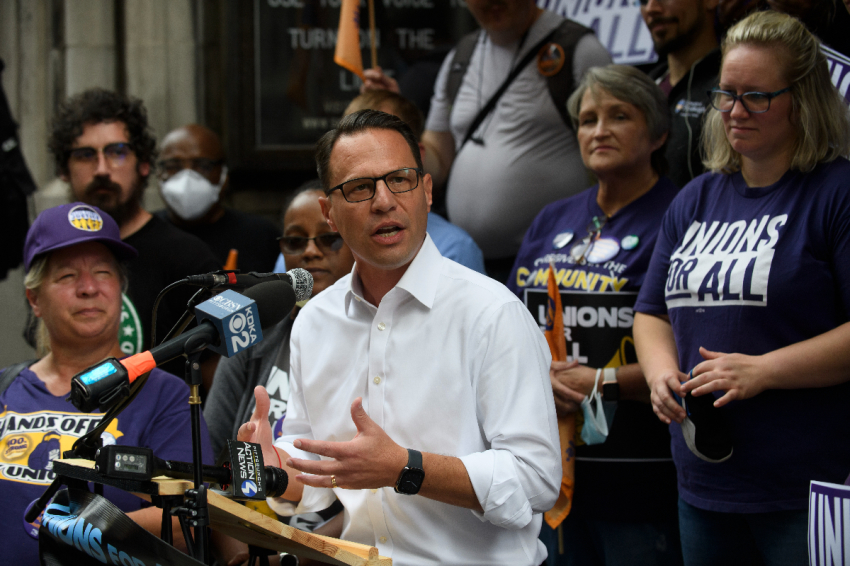Pennsylvania's Democratic gubernatorial nominee supports school choice proposal

Pennsylvania Democratic gubernatorial nominee and the state's current Attorney General Josh Shapiro has expressed support for at least some private school choice, drawing the cautious optimism of national school choice advocates.
Addressing his supporters Saturday, Shapiro discussed his support for a Lifeline Scholarship bill under consideration that would give parents with children attending failing schools power to reallocate their children's state education dollars.
The candidate also discussed his plans to continue Gov. Tom Wolf's work on increasing state funding to public schools and students' access to technical and vocational courses. After the speech, he provided more information regarding his position on the bill when taking questions from reporters.
"I'm for fully funding public education. I'm for making sure we give parents the ability put their kids in the best situation for them to be able to succeed," he said, according to Penn Live.
"And I'm for making sure we add scholarships like Lifeline Scholarships to make sure that that's additive to their educations. That it gives them other opportunities ... to be able to help them achieve success."
Shapiro called student scholarships a "both/and" proposition regarding public schools. The attorney general also stated that he has always supported fully funding education to provide kids with equal opportunities and ensure the state meets its "Constitutional obligation" to provide fair funding statewide.
The education page on Shapiro's campaign website outlines that "Josh favors adding choices for parents and educational opportunity for students and funding lifeline scholarships like those approved in other states and introduced in Pennsylvania."
The Lifeline Scholarship bill, also known as House Bill-2169, is sponsored by Pennsylvania Republican House Reps. Clint Owlett and Martina White. It passed the GOP-led House in April in a 104-98 vote, with only one Democrat supporting the bill.
In June, the bill passed the Senate Education Committee in a 7-4 vote, but an amendment added to the bill would again require a final vote of passage from the House. Even if it were to pass, Senate leadership would expect a veto due to Gov. Tom Wolf's opposition to school choice proposals.
The bill applies to elementary and secondary school students who attend schools that fall into the bottom 15% based on aggregated standardized test scores.
It would enable parents to spend state money on approved educational expenses, including private school tuition, special needs services, tutoring and instructional materials.
In contrast, Shapiro's Republican opponent, Doug Mastriano, supports expanding school choice and fostering excellence through competition, according to his campaign website.
"While he'll make sure public schools are well-funded, he'll also fight like hell to provide them the competition that will make them great," the website reads.
"Mastriano will work with the legislature to finally bring school choice to Pennsylvania families so that no child is trapped in a failing school ever again."
According to a Morning Consult poll, 77% of Pennsylvania parents support an education savings accounts, while 72% and 74% favor school vouchers and charter schools, respectively. The poll surveyed 1,348 adults, with 706 being parents of schoolchildren.
Jeanne Allen, CEO of the Center for Education Reform, an organization that supports school choice initiatives, believes that "it might be hard to trust that Shapiro will really enthusiastically place his support behind this work once elected" considering he has the strong backing of teachers' unions.
"Officials find all sorts of reasons to get out of commitments they made when they were running," she stated in an email newsletter. "And many will turn their backs on prior commitments, sadly like Senator Cory Booker did when he stopped supporting school choice."
The ongoing debate over school choice has received attention from other 2022 gubernatorial races, including the contest in Texas between Republican Gov. Greb Abbott and his Democratic challenger and former Congressman Beto O'Rourke.
In May, Abbott voiced support for school vouchers, which would allow parents to use tax dollars to send their children to the school of their choosing. However, O'Rourke believes that doing so would cripple traditional public schooling in certain areas.
As The Texas Tribune reported in August, O'Rourke's campaign spent $40,000 on newspaper advertisements, declaring that voters should not "let Greg Abbott privatize public education in Abilene." The former Congressman also claimed in a July speech to rural Texans that Abbott had "left behind" most of their communities.
"For our rural communities, where there's only one school district and only one option of public school, he wants to defund that through vouchers, take your tax dollars out of your classroom and send it to a private school in Dallas or Austin or somewhere else at your expense," O'Rourke said.
In July, Arizona adopted the country's most robust school choice law. The bill makes all K-12 students in the state eligible for scholarship funds. Families can receive over $6,500 per year per child for private school, homeschooling, micro schools, tutoring or other educational services outside the public school system.
In August, the nonpartisan research group Education Next reported that around 2 million fewer students are enrolled in public schools since the spring of 2020 when in-person learning ceased during the pandemic.
From 2020-2022, public school enrollment declined from 81% to 76.5%, while charter school enrollment increased from 5% to 7.2%. In addition, private school enrollment increased from 8% to 9.7%, and homeschooling rose from 6% to 6.6%.



























